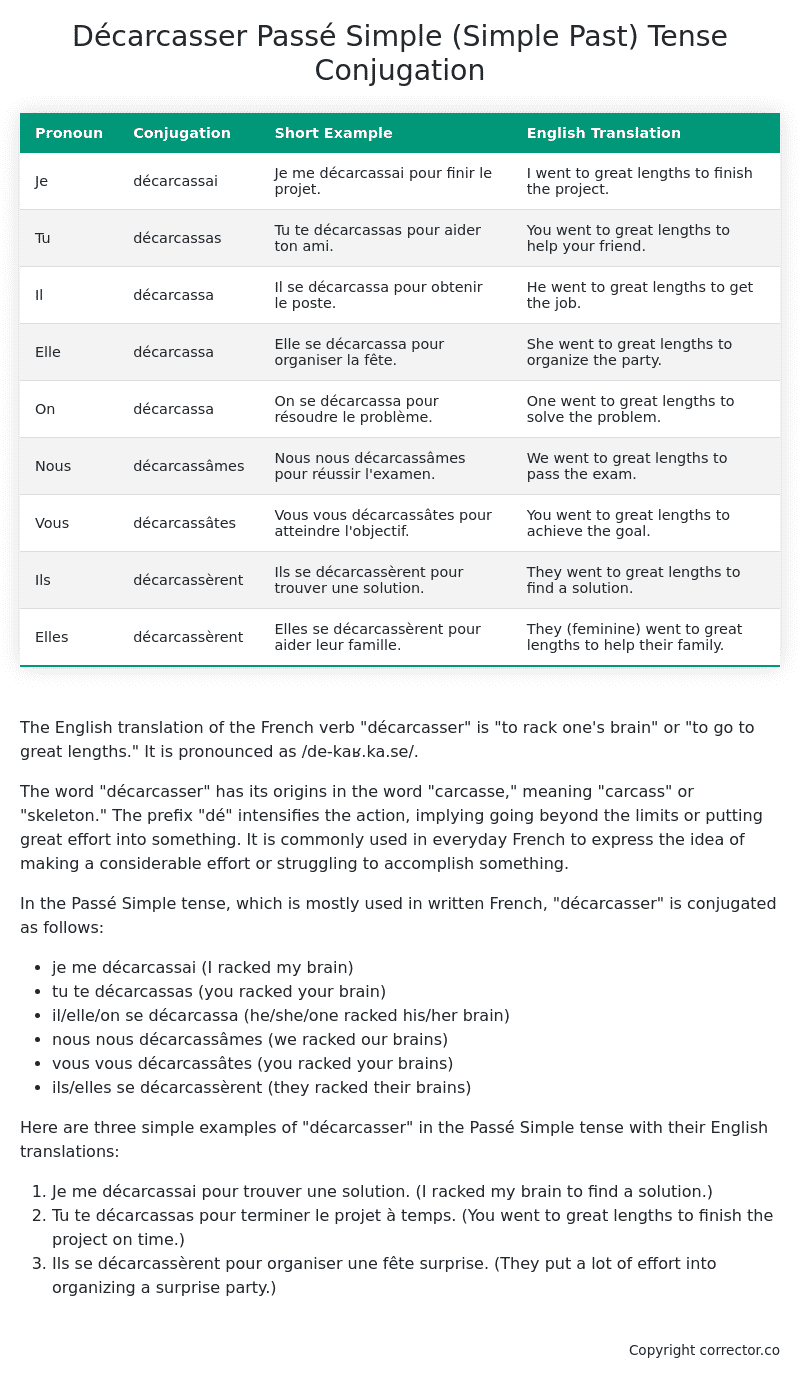Passé Simple (Simple Past) Tense Conjugation of the French Verb décarcasser
Introduction to the verb décarcasser
The English translation of the French verb “décarcasser” is “to rack one’s brain” or “to go to great lengths.” It is pronounced as /de-kaʁ.ka.se/.
The word “décarcasser” has its origins in the word “carcasse,” meaning “carcass” or “skeleton.” The prefix “dé” intensifies the action, implying going beyond the limits or putting great effort into something. It is commonly used in everyday French to express the idea of making a considerable effort or struggling to accomplish something.
In the Passé Simple tense, which is mostly used in written French, “décarcasser” is conjugated as follows:
- je me décarcassai (I racked my brain)
- tu te décarcassas (you racked your brain)
- il/elle/on se décarcassa (he/she/one racked his/her brain)
- nous nous décarcassâmes (we racked our brains)
- vous vous décarcassâtes (you racked your brains)
- ils/elles se décarcassèrent (they racked their brains)
Here are three simple examples of “décarcasser” in the Passé Simple tense with their English translations:
- Je me décarcassai pour trouver une solution. (I racked my brain to find a solution.)
- Tu te décarcassas pour terminer le projet à temps. (You went to great lengths to finish the project on time.)
- Ils se décarcassèrent pour organiser une fête surprise. (They put a lot of effort into organizing a surprise party.)
Table of the Passé Simple (Simple Past) Tense Conjugation of décarcasser
| Pronoun | Conjugation | Short Example | English Translation |
|---|---|---|---|
| Je | décarcassai | Je me décarcassai pour finir le projet. | I went to great lengths to finish the project. |
| Tu | décarcassas | Tu te décarcassas pour aider ton ami. | You went to great lengths to help your friend. |
| Il | décarcassa | Il se décarcassa pour obtenir le poste. | He went to great lengths to get the job. |
| Elle | décarcassa | Elle se décarcassa pour organiser la fête. | She went to great lengths to organize the party. |
| On | décarcassa | On se décarcassa pour résoudre le problème. | One went to great lengths to solve the problem. |
| Nous | décarcassâmes | Nous nous décarcassâmes pour réussir l’examen. | We went to great lengths to pass the exam. |
| Vous | décarcassâtes | Vous vous décarcassâtes pour atteindre l’objectif. | You went to great lengths to achieve the goal. |
| Ils | décarcassèrent | Ils se décarcassèrent pour trouver une solution. | They went to great lengths to find a solution. |
| Elles | décarcassèrent | Elles se décarcassèrent pour aider leur famille. | They (feminine) went to great lengths to help their family. |
Other Conjugations for Décarcasser.
Le Present (Present Tense) Conjugation of the French Verb décarcasser
Imparfait (Imperfect) Tense Conjugation of the French Verb décarcasser
Passé Simple (Simple Past) Tense Conjugation of the French Verb décarcasser (You’re reading it right now!)
Passé Composé (Present Perfect) Tense Conjugation of the French Verb décarcasser
Futur Simple (Simple Future) Tense Conjugation of the French Verb décarcasser
Futur Proche (Near Future) Tense Conjugation of the French Verb décarcasser
Plus-que-parfait (Pluperfect) Tense Conjugation of the French Verb décarcasser
Passé Antérieur (Past Anterior) Tense Conjugation of the French Verb décarcasser
Futur Antérieur (Future Anterior) Tense Conjugation of the French Verb décarcasser
Subjonctif Présent (Subjunctive Present) Tense Conjugation of the French Verb décarcasser
Subjonctif Passé (Subjunctive Past) Tense Conjugation of the French Verb décarcasser
Subjonctif Imparfait (Subjunctive Imperfect) Tense Conjugation of the French Verb décarcasser
Conditionnel Présent (Conditional Present) Tense Conjugation of the French Verb décarcasser
Conditionnel Passé (Conditional Past) Tense Conjugation of the French Verb décarcasser
Conditionnel Passé II (Conditional Past II) Tense Conjugation of the French Verb décarcasser
L’impératif Présent (Imperative Present) Tense Conjugation of the French Verb décarcasser
L’impératif Passé (Imperative Past) Tense Conjugation of the French Verb décarcasser
L’infinitif Présent (Infinitive Present) Tense Conjugation of the French Verb décarcasser
L’infinitif Passé (Infinitive Past) Tense Conjugation of the French Verb décarcasser
Le Participe Présent (Present Participle) Tense Conjugation of the French Verb décarcasser
Le Participe Passé (Past Participle) Tense Conjugation of the French Verb décarcasser
Struggling with French verbs or the language in general? Why not use our free French Grammar Checker – no registration required!
Get a FREE Download Study Sheet of this Conjugation 🔥
Simply right click the image below, click “save image” and get your free reference for the décarcasser Passé Simple tense conjugation!

Décarcasser – About the French Passé Simple (Simple Past) Tense
Formation
Usage
Narration
Historical Context
Interactions with other tenses
Passé Composé
Imparfait
Conditional and Subjunctive
Summary
I hope you enjoyed this article on the verb décarcasser. Still in a learning mood? Check out another TOTALLY random French verb conjugation!


